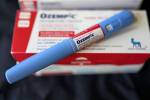Doctor says gene may give predisposition to diabetes
March 22 is National Diabetes Day, but Jennifer Vaughan knows all too well what diabetes means. Her son, Ryan, was diagnosed with type 1 when he was 9.
The disease is seeing an upsurge in Americans. According to the American Diabetes Association, 1.4 million Americans are diagnosed each year. It’s the seventh-leading cause of death in the U.S.
Before Ryan, a Las Vegas resident, was diagnosed, there were indicators, but they were always things that could be written off as regular childhood ailments, his mother said.
The family was at Disneyland, for example, when Ryan was 7. He was constantly thirsty during the trip and excusing himself to use the restroom. Even when they’d waited in a long line and they were second from getting on a ride, he had to leave the line to use the bathroom. Was it nervousness? Fear, maybe? That night, Ryan was running to the bathroom for another reason: He was vomiting.
“I thought maybe he caught a bug, ate something bad … your mind comes up with all sorts of possibilities,” Jennifer said. “It doesn’t automatically go to ‘diabetes.’ ”
The family took him to the doctor, and the diagnosis was made. It took almost a year to tweak his insulin intake to the proper amount for him. There were a couple of times he wound up in the ER before it became manageable. Nights, said Jennifer, were the worst.
“I would set my alarm for every two hours so I could go in his room and prick his finger for his (blood sugar) levels,” she said. “There were nights when I’d just sit beside him as he slept, watching him, worried. … My biggest fear was if he got too much insulin at night, and his blood glucose dropped, he could fall asleep and not wake up.”
Ryan has juvenile diabetes, but many Americans develop type 2, or adult-onset diabetes. It used to be thought that the cause was simply due to bad dietary habits. Now, researchers are finding a gene may be responsible.
“We think it’s a gene that gives you have a high disposition to it,” said Dr. Eileen Shi of HealthCare Partners Nevada. “In fact, we think something like a viral infection or an illness can open that gene. And with diet, it’s related. Obesity, when you’re overweight, you’re more likely to develop it. With diabetes, your body becomes less sensitive to insulin, the hormone that your body produces when the sugar level is too high. The job of insulin is to alert your body to take in that extra sugar to keep your sugar levels stable. When you have type 2 diabetes, because your body’s been flooded with sugar, sugar, sugar, sometimes your ability to deal with sugar becomes overwhelmed. So, type 2 is called ‘insulin resistance,’ when there is insulin but your cells are like, ‘Yeah, yeah, yeah, we see you all the time. We don’t want to do what you tell us to anymore.’ It’s like you’ve flooded your body with so much sugar, it’s like the ‘Boy Who Cried Wolf.’ The whole time, your body’s not responding.”
The consequences of diabetes reach nearly every aspect of your body, Shi said. One can develop things such as macular degeneration and/or glaucoma, have neuropathy issues, a weakened heart, digestion difficulties, be susceptible to skin infections and experience chronic kidney problems.
“It can affect every organ system in your body,” she said.
Eating properly can help control it. If one is pre-diabetic, it’s possible to fend it off with a diet high in lean proteins, whole grain foods and vegetables, she said.
Shi warned that diabetics should be careful how much fruit they ingest, as too much can spike their sugar levels.
Once one has full-blown diabetes, can the process be reversed?
“The verdict is still out there. Your liver is so damaged, your organs are tired; it may be too late to reverse all that damage,” Shi said. “Every doctor will say that a good diet will help your prognosis.”
The doctor said she eats five servings of vegetables and fish, stays away from processed foods, and never, ever goes to fast-food restaurants. In fact, the one time her bank’s fraud department contacted her under the suspicion her credit card had been stolen was because it was used at a place totally out of character for her: a McDonald’s. Sure enough, it wasn’t her charge.
Shi suggested that if one is at risk for diabetes, it should be the whole family that gets on board with healthier lifestyles.
“How can there be one person making a dietary change when you’re still cooking less healthy options at home? It’s going to be almost impossible for that person because it’s a lifestyle change,” Shi said. “Every diabetic patient does better when they have a support network. Their family can go, ‘Let’s go exercise together,’ or ‘Let’s eat healthier together,’ and that will make (the diabetic’s path) more successful.”
Ryan Vaughan, now 15, wears an insulin pump which automatically injects medication into his system. If you were to see him on the street, you would never know he has a potentially life-threatening condition.
“That’s the thing about diabetes,” Jennifer said. “You can look perfectly normal on the outside, but if your blood sugar level goes too low, you’re out cold. It’s an insidious disease. I mean, in a matter of hours, you could go from walking around to being in the emergency room.”
Visit diabetes.org.
To reach Summerlin Area View reporter Jan Hogan, email jhogan@viewnews.com or call 702-387-2949.





























